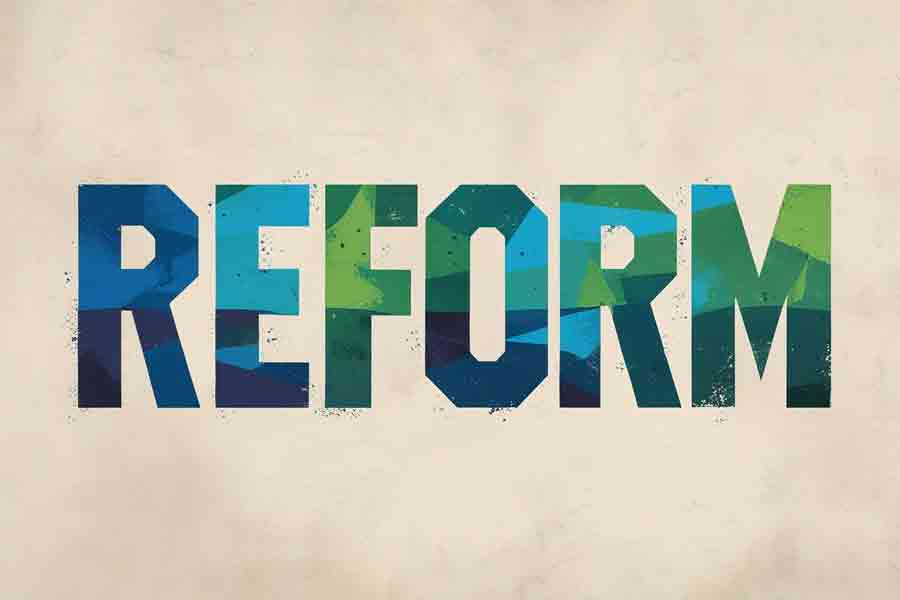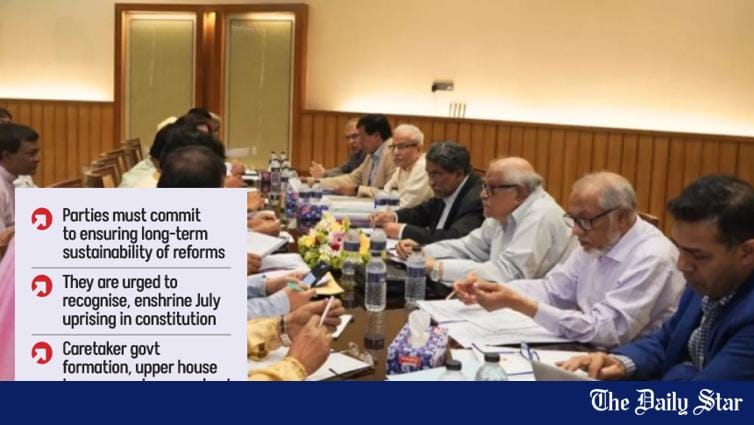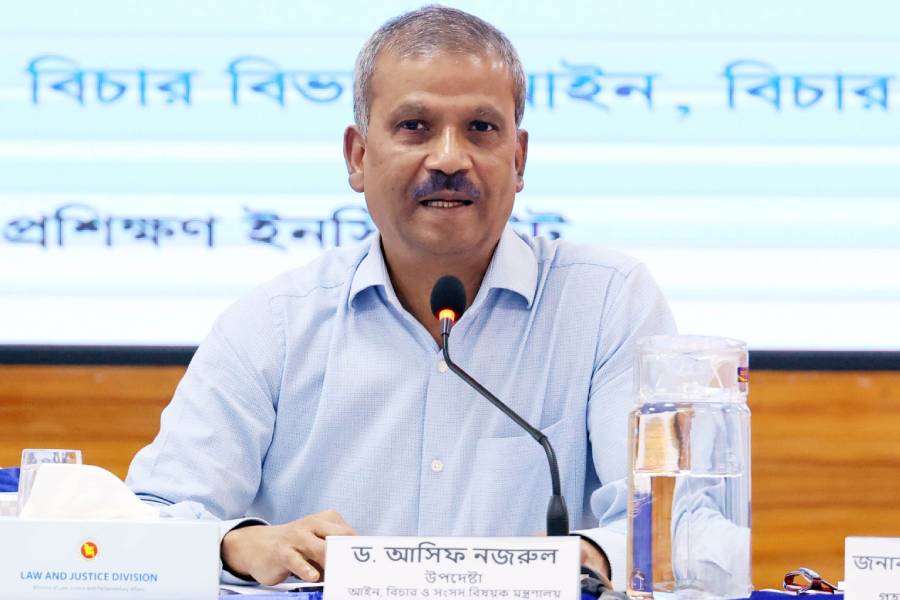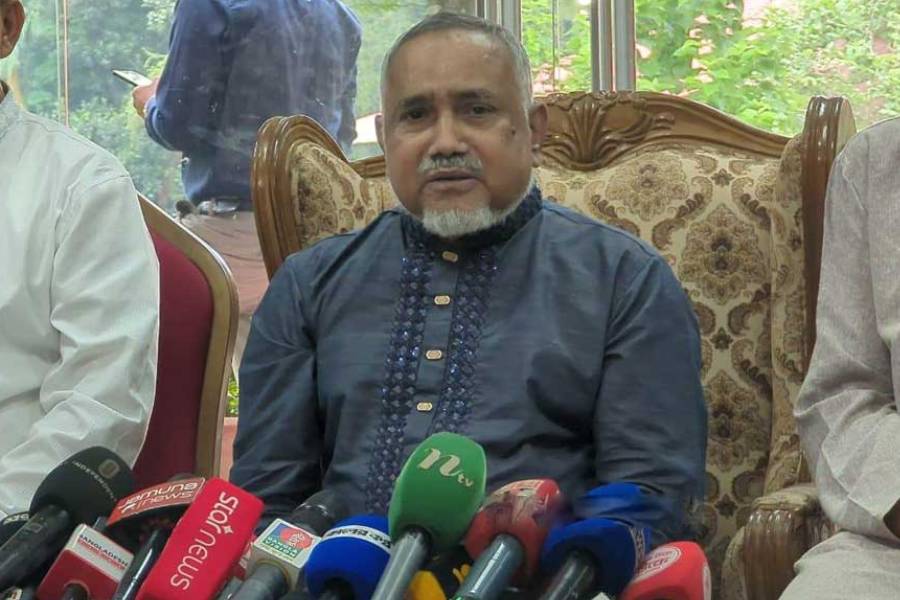Saif
Senior Member
- Joined
- Jan 24, 2024
- Messages
- 16,508
- Likes
- 8,140
- Nation

- Residence

- Axis Group


The missing agenda from reform narratives
Beginning as a protest against quota in government services, the July-August movement gained strength to sweep the length and breadth of this land relying on the rallying cry of making the nation discrimination-free. As many as 11 reform commissions were formed apart from a 12-member committee to p
The missing agenda from reform narratives
Neil Ray
Published :
Jul 27, 2025 23:53
Updated :
Jul 28, 2025 00:52

Beginning as a protest against quota in government services, the July-August movement gained strength to sweep the length and breadth of this land relying on the rallying cry of making the nation discrimination-free. As many as 11 reform commissions were formed apart from a 12-member committee to prepare a white paper on the country's state of economy. But what is missing from all such exercises is the socio-economic discrimination, the core issue that attracted the working class people to participate in the movement. Strangely, the student leaders who joined the interim government as advisers were not known to press for this basic issue. One of the student advisers who resigned to advance the cause of his Jatyia Nagorik Party or National Citizen Party (NCP) and has been leading the month-long programme of march and rally titled "July March to Build the Nation" no longer propagates or insists on establishing this agenda.
That the bureaucratic and elitist mindset stands in the way of socio-economic reform allowing greater space for the poor and marginalised is indisputable. So, the incumbency of incorporating the ideals and principles, if any, into the political narratives was squarely upon the NCP leaders and their followers. Let alone the details of going about convincing the mass people of such a lofty socio-economic benchmark, the very word does not figure in political discourse. But it was the low-income working class people whose participation was the highest. Even the number of killed among this segment of people, according to reports, was 284 highest among all. The next highest victims during the uprising were students numbering 269.
Not only has the sacrifice made by the faceless multitudes gone less recognised than they really deserved but the expectation and hope germinated during those heady days have long faded away. These are the people who are hardly interested in constitutional, judiciary or administrative reform. They simply wanted to be at ease when they go to the market for purchasing their bare minimum victuals and essentials. These people wanted security of their jobs and income levels compatible with the market prices for a modest living. They have been terribly frustrated. Instead of creation of new avenues for employment, there have been retrenchment and job losses due to closure of factories.
Contrarily, spates of market volatility have pushed them on to the brink. They have none to turn back and are therefore suffering in silence. Unsurprising, 2.6 million more people have freshly found themselves below the poverty line. Even, the social security net has been curtailed and nobody knows what awaits these hapless people. The interim government has lost precious times to act. This country has been fed up with the sermon "social business can change the world". After almost a year, it is not the poor of this land who have at all been beneficiaries of social business although some selective NGOs have.
It is against this economic hardship of the working class people, a new pay commission for government and semi-government employees has been constituted. There is indeed a limit to disdainfully treating the cause of the voiceless. Notably, the interim government made a similar attempt to restructure their salary immediately after assuming power. It backed away when there were widespread criticisms against the move. Has the situation been in favour of going ahead with the programme? Economists have made their opposition known with unreserved terms. Its impacts on market volatility are likely to be telling for the low-income people in the informal sector. Discriminations, disparities and inequalities are far too lofty issues to be addressed, now the working class people are unable to pursue the bare minimum survival strategy they somehow did before.
Neil Ray
Published :
Jul 27, 2025 23:53
Updated :
Jul 28, 2025 00:52
Beginning as a protest against quota in government services, the July-August movement gained strength to sweep the length and breadth of this land relying on the rallying cry of making the nation discrimination-free. As many as 11 reform commissions were formed apart from a 12-member committee to prepare a white paper on the country's state of economy. But what is missing from all such exercises is the socio-economic discrimination, the core issue that attracted the working class people to participate in the movement. Strangely, the student leaders who joined the interim government as advisers were not known to press for this basic issue. One of the student advisers who resigned to advance the cause of his Jatyia Nagorik Party or National Citizen Party (NCP) and has been leading the month-long programme of march and rally titled "July March to Build the Nation" no longer propagates or insists on establishing this agenda.
That the bureaucratic and elitist mindset stands in the way of socio-economic reform allowing greater space for the poor and marginalised is indisputable. So, the incumbency of incorporating the ideals and principles, if any, into the political narratives was squarely upon the NCP leaders and their followers. Let alone the details of going about convincing the mass people of such a lofty socio-economic benchmark, the very word does not figure in political discourse. But it was the low-income working class people whose participation was the highest. Even the number of killed among this segment of people, according to reports, was 284 highest among all. The next highest victims during the uprising were students numbering 269.
Not only has the sacrifice made by the faceless multitudes gone less recognised than they really deserved but the expectation and hope germinated during those heady days have long faded away. These are the people who are hardly interested in constitutional, judiciary or administrative reform. They simply wanted to be at ease when they go to the market for purchasing their bare minimum victuals and essentials. These people wanted security of their jobs and income levels compatible with the market prices for a modest living. They have been terribly frustrated. Instead of creation of new avenues for employment, there have been retrenchment and job losses due to closure of factories.
Contrarily, spates of market volatility have pushed them on to the brink. They have none to turn back and are therefore suffering in silence. Unsurprising, 2.6 million more people have freshly found themselves below the poverty line. Even, the social security net has been curtailed and nobody knows what awaits these hapless people. The interim government has lost precious times to act. This country has been fed up with the sermon "social business can change the world". After almost a year, it is not the poor of this land who have at all been beneficiaries of social business although some selective NGOs have.
It is against this economic hardship of the working class people, a new pay commission for government and semi-government employees has been constituted. There is indeed a limit to disdainfully treating the cause of the voiceless. Notably, the interim government made a similar attempt to restructure their salary immediately after assuming power. It backed away when there were widespread criticisms against the move. Has the situation been in favour of going ahead with the programme? Economists have made their opposition known with unreserved terms. Its impacts on market volatility are likely to be telling for the low-income people in the informal sector. Discriminations, disparities and inequalities are far too lofty issues to be addressed, now the working class people are unable to pursue the bare minimum survival strategy they somehow did before.






































